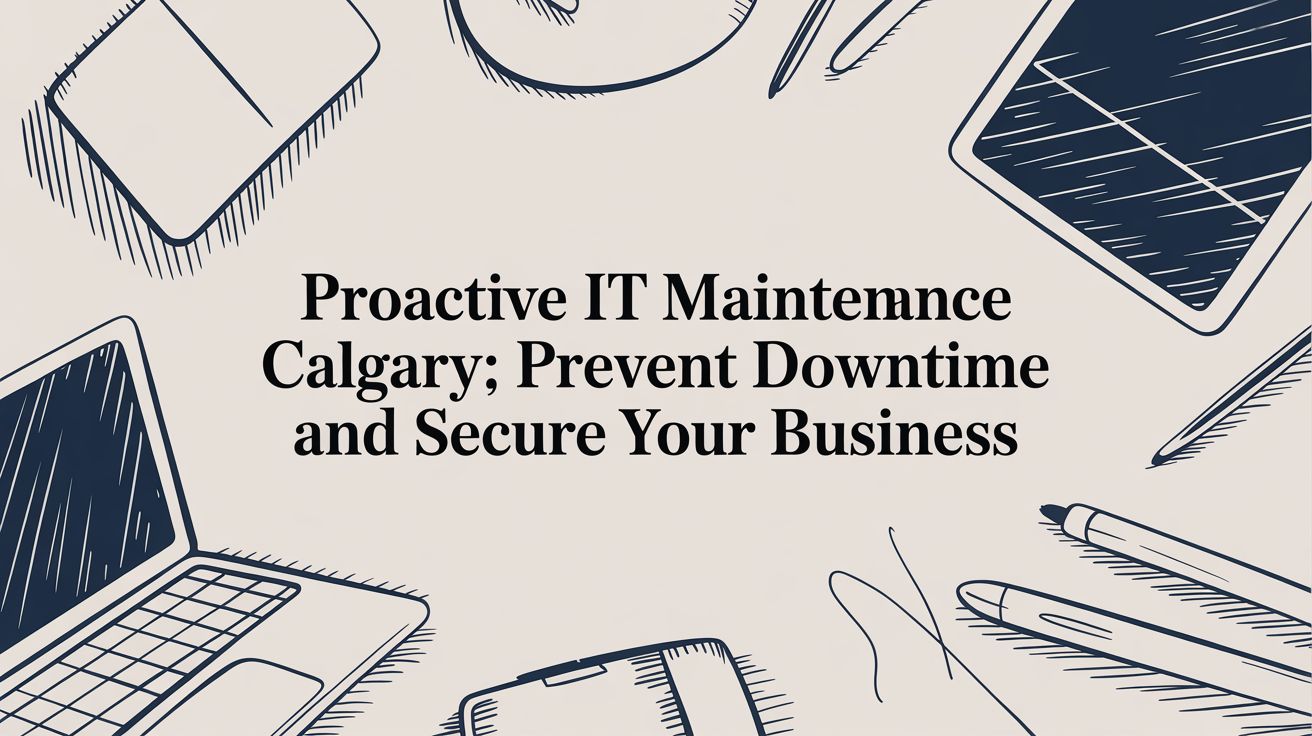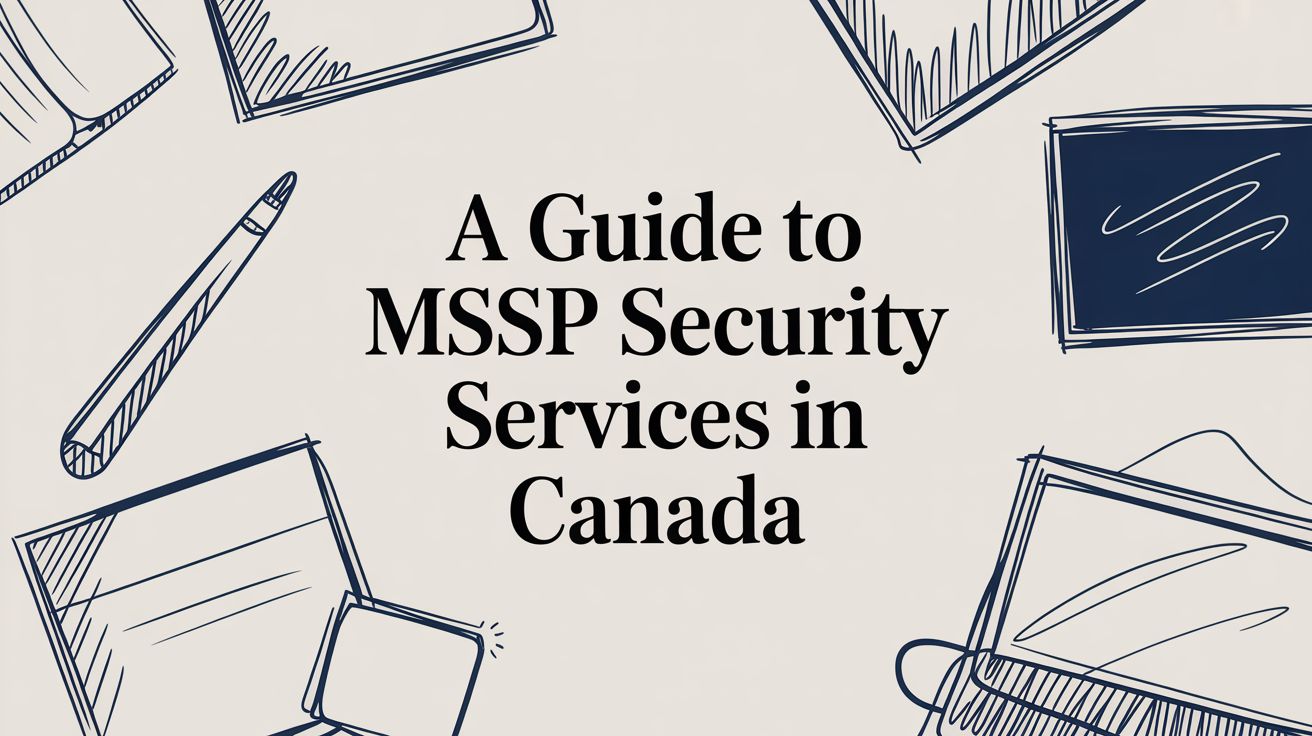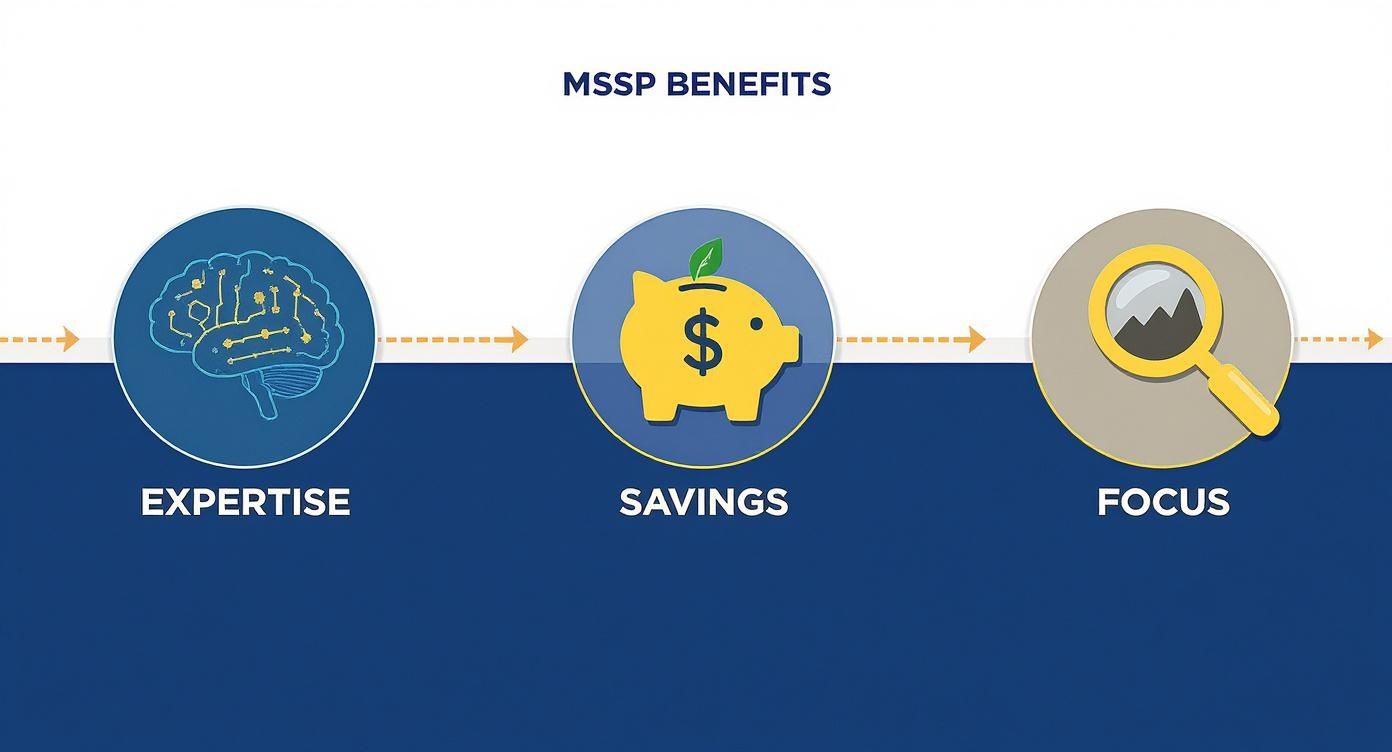
February 3, 2026
Proactive IT Maintenance Calgary: Prevent Downtime and Secure Your BusinessUnlock uptime with proactive it maintenance calgary, delivering secure IT systems and practical strategies for Calgary businesses.
Read Full Post%20(1).webp)
Usman Malik
Chief Executive Officer
November 5, 2025

What if your organization could have an elite, 24/7 security team guarding your digital assets without the significant cost of building one in-house? That is the core promise of MSSP security services. This model involves outsourcing your cybersecurity operations to a specialized third-party provider, giving your business access to top-tier expertise and technology through a predictable subscription.

For many medium-sized Canadian organizations, establishing an effective in-house cybersecurity department presents a formidable challenge. The costs to hire, train, and retain specialized security analysts—not to mention the constant investment in the advanced software and hardware they require—are often prohibitive. This is precisely where a Managed Security Service Provider (MSSP) becomes a strategic partner.
An MSSP functions as a specialized security firm for your digital environment. While your internal IT team focuses on maintaining daily operations and ensuring systems run smoothly, the MSSP acts as your dedicated guardian. They work around the clock to protect your network, data, and personnel from evolving threats.
The need for this specialized protection is more urgent than ever. Cyber threats are becoming increasingly sophisticated and are targeting organizations of all sizes. Most businesses face two significant hurdles when attempting to build their own defence:
An MSSP addresses both of these challenges. By partnering with one, you gain immediate access to a team of seasoned security experts and a comprehensive suite of advanced security technologies. It is an intelligent move that converts a large potential capital expense into a predictable, manageable operating expense.
An MSSP provides a powerful force multiplier, allowing businesses to achieve a security posture that would otherwise be out of reach. It is about leveraging shared expertise to build a defence that is greater than the sum of its parts.
This strategic value is being recognized across Canada. As businesses embrace digital transformation and cloud adoption, the demand for robust security has grown exponentially. The managed security services market in Canada reached USD 17,304.83 million in 2024 and is projected to climb to USD 44,994.07 million by 2032.
This growth is more than just a number; it tells a story. It shows that MSSP security services are no longer a "nice-to-have" but a fundamental necessity for protecting your organization's data, reputation, and future. You can explore the Canadian managed services market trends in this report.

So, what do MSSP security services actually do for your organization day-to-day? While understanding the definition is important, the real value lies in the concrete actions they take to protect your business.
Each service acts as a pillar supporting your company’s overall defence. Individually, each is strong. Together, they create a multi-layered shield far more resilient than any single tool or strategy. Let's examine the essential services a high-quality MSSP delivers.
Imagine a digital watchtower for your entire IT environment, staffed around the clock by expert guards. That is the core of 24/7 monitoring and threat detection. Cyber threats do not adhere to a 9-to-5 schedule; an attack is just as likely to occur at 2 a.m. on a Sunday as it is on a Tuesday afternoon.
An MSSP uses powerful tools like Security Information and Event Management (SIEM) systems to collect and analyze activity logs from every corner of your network—servers, applications, and endpoints—in real-time. These systems are configured to identify suspicious patterns that could signal a breach, allowing security analysts to respond immediately. This constant vigilance is your first line of defence, designed to stop attackers before they can establish a foothold.
This non-stop oversight is critical. The average time to identify and contain a data breach is a staggering 277 days. An MSSP’s 24/7 monitoring dramatically reduces that window, minimizing potential damage and costs.
Every device connected to your network is an "endpoint." Laptops, servers, mobile phones, and tablets—each one is a potential entry point for an attacker. Managed endpoint protection is about securing these doorways, going far beyond basic antivirus software to protect devices against malware, ransomware, and other advanced attacks.
This service involves deploying and managing advanced Endpoint Detection and Response (EDR) tools. If a threat is detected on a device, the MSSP can instantly isolate it from the network to prevent the attack from spreading, all while investigating the root cause. It is an essential component of modern security, especially as more teams adopt remote work models.
The most effective way to handle a security breach is to prevent it from happening in the first place. That is what proactive vulnerability management is all about: identifying, assessing, and remediating security weaknesses in your systems before an attacker can exploit them.
Think of it as a professional inspection for your entire digital infrastructure. The MSSP regularly scans your networks and applications for known vulnerabilities, such as outdated software or misconfigured systems. They then prioritize these weaknesses based on severity and provide a clear roadmap for your team to patch the most critical gaps first.
Even with the best defences, a security incident can still occur. When it does, a fast, organized response is crucial to containing the damage. An expert-led incident response (IR) service provides a team of specialists ready to take action the moment a breach is confirmed.
Your MSSP will have a pre-established IR plan that maps out every step, from detection and containment to threat eradication and system recovery. This process eliminates panic and confusion during a high-stakes event, ensuring a coordinated response that minimizes downtime and data loss. It provides the structured approach necessary to maintain business continuity.
For Canadian businesses in sectors like healthcare, finance, or legal services, adhering to data protection regulations like PIPEDA is not optional—it is the law. MSSP security services are a significant asset in meeting these complex compliance requirements.
A seasoned MSSP provides the tools and processes needed for continuous monitoring, secure data handling, and the detailed reporting required to demonstrate compliance. They help generate the evidence you need for audits, proving due diligence and ensuring you meet your legal obligations. While MSSPs focus on active protection, a complete strategy also considers the crucial role of data security in IT asset disposition to ensure sensitive data is handled securely when old equipment is retired.
Many of these capabilities, especially threat detection and incident response, are also central to other security models. To better understand how these services compare, you can explore our detailed guide on Managed Detection and Response solutions.
Choosing a security partner can feel overwhelming due to the number of acronyms used in the industry. MSP, MSSP, and MDR are often used interchangeably, but they represent vastly different approaches to IT and security. Selecting the wrong one can leave your organization dangerously exposed.
A Managed Service Provider (MSP) is like a general contractor for your technology infrastructure—they ensure everything runs smoothly day-to-day. An MSSP is the specialized security company you hire to install and monitor a state-of-the-art security system. A Managed Detection and Response (MDR) provider is the elite tactical team that actively hunts for intruders who are sophisticated enough to evade standard alarms.
Let’s unpack these roles so you can determine which one best fits your business needs.
While all three providers operate within your technology environment, their core missions are distinct. An MSP is focused on operational uptime and efficiency. An MSSP’s world revolves around security services—preventing threats and maintaining compliance. MDR takes it a step further, focusing intensely on hunting down and neutralizing the most sophisticated threats.
This distinction is critical. Your choice directly impacts your budget, daily operations, and overall resilience to an attack. Relying on a general MSP for specialized security is like asking a family doctor to perform open-heart surgery. They understand the fundamentals but lack the specific tools, training, and real-time expertise required for such a high-stakes job.
One of the most common mistakes we see is businesses assuming their MSP provides the same level of protection as an MSSP. An MSP might manage your firewall, but an MSSP will analyze its traffic 24/7, correlate alerts with global threat intelligence, and actively search for the faint signals of a breach.
To cut through the noise, it helps to compare these providers side-by-side. Each offers unique value, and the right partner for you depends entirely on your business's current state and future security requirements.
Here’s a quick rundown to make the differences clear.
The table below breaks down the key differences in focus, scope, and the typical services you can expect from each type of provider. It’s a simple way to map their capabilities to your organization’s needs.
Ultimately, understanding this landscape helps you make a strategic investment in your company’s security. For most Canadian businesses, an MSSP strikes the ideal balance. It delivers a powerful security program with proactive defence, 24/7 monitoring, and compliance support, all without requiring you to become a cybersecurity expert yourself.
For Canadian small and mid-sized businesses, partnering with an MSSP is not just about delegating a task—it is a significant strategic advantage. It levels the playing field, providing access to the kind of security expertise and technology that was once exclusive to large corporations, at a cost that is practical for your budget.
This partnership fundamentally transforms your security posture. You move from a reactive, unpredictable cost centre to a proactive, manageable investment. The key benefit is not just improved protection; it is the freedom to focus on what you do best: growing your business.
Building a security team from scratch is a monumental undertaking. First, you must find, hire, and retain highly sought-after security analysts. Then, you need to equip them with sophisticated tools like Security Information and Event Management (SIEM) platforms and Endpoint Detection and Response (EDR) solutions. The combined cost for salaries and technology can easily reach hundreds of thousands of dollars annually.
An MSSP removes these barriers.
With a simple subscription model, you gain immediate access to a fully-staffed, 24/7 Security Operations Centre (SOC) and a complete arsenal of enterprise-grade security tools. You get a mature security program from day one, without the crushing capital investment and operational headaches.
This model is a primary driver behind the growth of MSSP security services in Canada. The Canadian security market, which includes managed services, was valued at USD 6,604.6 million in 2024 and is expected to reach USD 10,937.0 million by 2030. This growth is fueled by the need for better defences against increasingly complex cyber threats and stricter data regulations. To delve into the data, you can learn more about the Canadian security market's growth.
One of the biggest financial challenges in cybersecurity is its unpredictability. A single, unexpected incident can trigger massive, unplanned costs for remediation and recovery. An MSSP changes this by shifting your security spending from a reactive capital expense (CapEx) to a predictable operating expense (OpEx).
You pay a fixed monthly fee, which makes budgeting for your security needs simple and transparent. This model also provides incredible agility.
This scalability ensures your security posture is always aligned with your business reality. You will not be overpaying for services you do not need or left exposed during a period of growth.
Your internal IT team is one of your most valuable assets, but they are often stretched thin juggling daily operations, user support, and strategic projects. When security threat monitoring is added to their responsibilities, they can become bogged down in a never-ending cycle of alert fatigue.
Partnering with an MSSP frees them from this constant burden. By entrusting the specialized, 24/7 work of threat monitoring and incident response to dedicated experts, you empower your IT staff to focus on initiatives that drive business value. Instead of chasing alerts, they can concentrate on improving infrastructure, supporting new business applications, and driving innovation. This logic is similar to what many businesses find with broader IT outsourcing; you can explore the strategic advantages of managed IT services in our detailed guide.
Selecting the right partner for your MSSP security services is one of the most critical business decisions you will make. This is not a one-time purchase; it is a long-term relationship built on trust, transparency, and deep technical expertise. To find the best fit, you need to look beyond marketing claims and assess what a provider can actually deliver.
This means asking direct, specific questions to understand their operational capabilities. The right partner will have not only impressive technology but also documented processes and a clear commitment to your success. Think of it less like buying a product and more like hiring a vital extension of your team.
Before delving into details, you need to evaluate the provider's core infrastructure. The backbone of any credible MSSP is its Security Operations Centre (SOC). This is the command centre where their analysts monitor, detect, and respond to threats around the clock.
Your first question should always be: Do you operate a 24/7/365 SOC, and is it staffed by your own employees? A provider that outsources its monitoring cannot offer the same level of accountability or rapid response as one with a dedicated, in-house team of security experts.
From there, investigate their technology stack. Ask what Security Information and Event Management (SIEM) and Endpoint Detection and Response (EDR) platforms they use. While you do not need to be an expert on specific brands, their answers will reveal the sophistication of the tools protecting your business.
A great MSSP operates on well-defined processes, not guesswork. Ask to review their documented incident response plan. This document should clearly outline every step they take when a security event occurs, from the initial alert to the final resolution.
Equally important are the Service Level Agreements (SLAs). These are the contractual commitments that define their service delivery, including guaranteed response times for critical incidents. An SLA is your assurance that they will act with urgency when you need it most.
A provider without clear, documented incident response plans and firm SLAs is a major red flag. In a crisis, you need a partner with a proven playbook, not one who is improvising.
The best partners also demonstrate a commitment to industry best practices through certifications. Look for credentials like SOC 2 or ISO 27001. These audits validate that the provider meets stringent standards for security, availability, and confidentiality.
The following infographic illustrates the core benefits—Expertise, Savings, and Focus—that a well-chosen MSSP partner brings to your organization.
This visual breaks down how an MSSP delivers immediate access to specialized skills and technology, turns high upfront costs into a predictable operational expense, and frees up your internal team to concentrate on strategic growth.
Cybersecurity is not one-size-fits-all. A provider with deep experience in your specific industry—whether it is healthcare, finance, or manufacturing—will understand the unique threats and compliance pressures you face. Do not hesitate to ask for client references from businesses similar to yours.
This industry knowledge is especially important as more providers shift to cloud-based delivery, a key trend in the Canadian managed security services market. Cloud delivery is now the leading deployment model because of its flexibility and cost-efficiency. This trend is helping fuel the market's projected growth at a CAGR of 13.7% from 2024 to 2030, driven by the need for the proactive monitoring that MSSPs provide.
For businesses in regulated sectors, understanding a provider's expertise in these modern environments is essential for meeting data protection rules. Our guide on navigating cybersecurity compliance solutions offers more insights into this critical area.
Finally, a structured onboarding process is a strong indicator of a professional and organized partner. A top-tier MSSP will have a transparent, multi-step plan for integrating their services into your environment. At CloudOrbis, for example, we use a proven 10-step onboarding process that covers everything from the initial assessment and strategy to full implementation and employee training. This methodical approach ensures a smooth transition with minimal disruption, setting the stage for a successful and secure long-term partnership.
Deciding to engage a Managed Security Service Provider (MSSP) is a major strategic step, so it is natural to have questions. To help you feel confident in your decision, we have compiled answers to the most common questions we hear from business leaders.
Our goal is to provide clear, straightforward answers that cut through the technical language and address what you need to know about financial investment, onboarding, and day-to-day collaboration.
The first question for most leaders is about the budget. A key advantage of MSSP pricing is its predictability. It transforms your security budget from a volatile, reactive expense into a stable, planned operational cost.
Most providers use a subscription model, typically calculated per user or per device, or sometimes based on the volume of data being monitored. This structure ensures your security investment scales directly with your business—without major surprises.
When evaluating different providers, insist on transparent pricing. A trustworthy partner will outline exactly what is included in your subscription, so you are not surprised by hidden fees later.
Ensure the quoted price covers all essentials. This should include 24/7 monitoring, core security tools like SIEM and EDR, regular reporting, and a clearly defined level of support for incident response.
Integrating a security partner into your environment is a careful, deliberate process. The timeline depends on the complexity of your current IT setup, the number of users and devices, and the specific services being implemented.
Generally, a well-managed onboarding can take anywhere from a few weeks to a couple of months. A reputable MSSP will not rush this phase. Instead, they will provide a detailed project plan with clear milestones, so you know exactly what is happening at each stage.
For example, our proven 10-step process at CloudOrbis is designed to be thorough without being disruptive:
The objective is a seamless transition that activates your new layer of protection as efficiently as possible, with minimal interruption to your team’s work.
Absolutely. The most successful partnerships are collaborative. An MSSP does not replace your internal IT team; it acts as a specialized extension of it, empowering your staff rather than making them redundant.
This creates a strategic division of labour. The MSSP handles the time-consuming and specialized work of 24/7 security monitoring, deep-dive threat hunting, and immediate incident response—tasks that are often beyond the capacity of a generalist IT team.
This frees your internal staff from the constant stress of security alerts, allowing them to focus on high-value projects that drive the business forward, such as improving internal systems or supporting employees.
The keys to effective collaboration are:
In this model, the MSSP provides specialized security expertise, while your team offers the invaluable business context needed to make smart, effective security decisions.
Yes, and for many businesses, this is one of the most significant benefits. This is especially true for Canadian companies in regulated sectors like finance, healthcare, or legal services. Navigating complex frameworks like PIPEDA is a major challenge, and a good MSSP can alleviate a large part of that burden.
Experienced providers have deep expertise in specific compliance standards, whether it is the Personal Information Protection and Electronic Documents Act (PIPEDA), PCI DSS for payment card processing, or provincial healthcare privacy laws. They provide the tools and documented processes you need to meet—and prove you are meeting—these strict requirements.
This support typically includes:
An MSSP helps you transform compliance from a major challenge into a manageable, integrated part of your security program, ultimately reducing your organization's risk.
Ready to secure your business with a proactive and expert-led approach? CloudOrbis provides comprehensive MSSP security services designed to protect Canadian businesses from modern threats. Let us handle your security so you can focus on growth.

February 3, 2026
Proactive IT Maintenance Calgary: Prevent Downtime and Secure Your BusinessUnlock uptime with proactive it maintenance calgary, delivering secure IT systems and practical strategies for Calgary businesses.
Read Full Post
February 2, 2026
A Guide to IT Compliance for the Alberta Oil & Gas IndustryMaster it compliance for alberta oil & gas industry with a practical, click-ready guide on AER/TIER, cybersecurity controls, and audit readiness.
Read Full Post
February 1, 2026
A Guide to IT Compliance Needs for Alberta Private Career CollegesExplore it compliance needs alberta private career college with practical guidance on PIPA, the PVT Act, and core security controls to protect student data.
Read Full Post